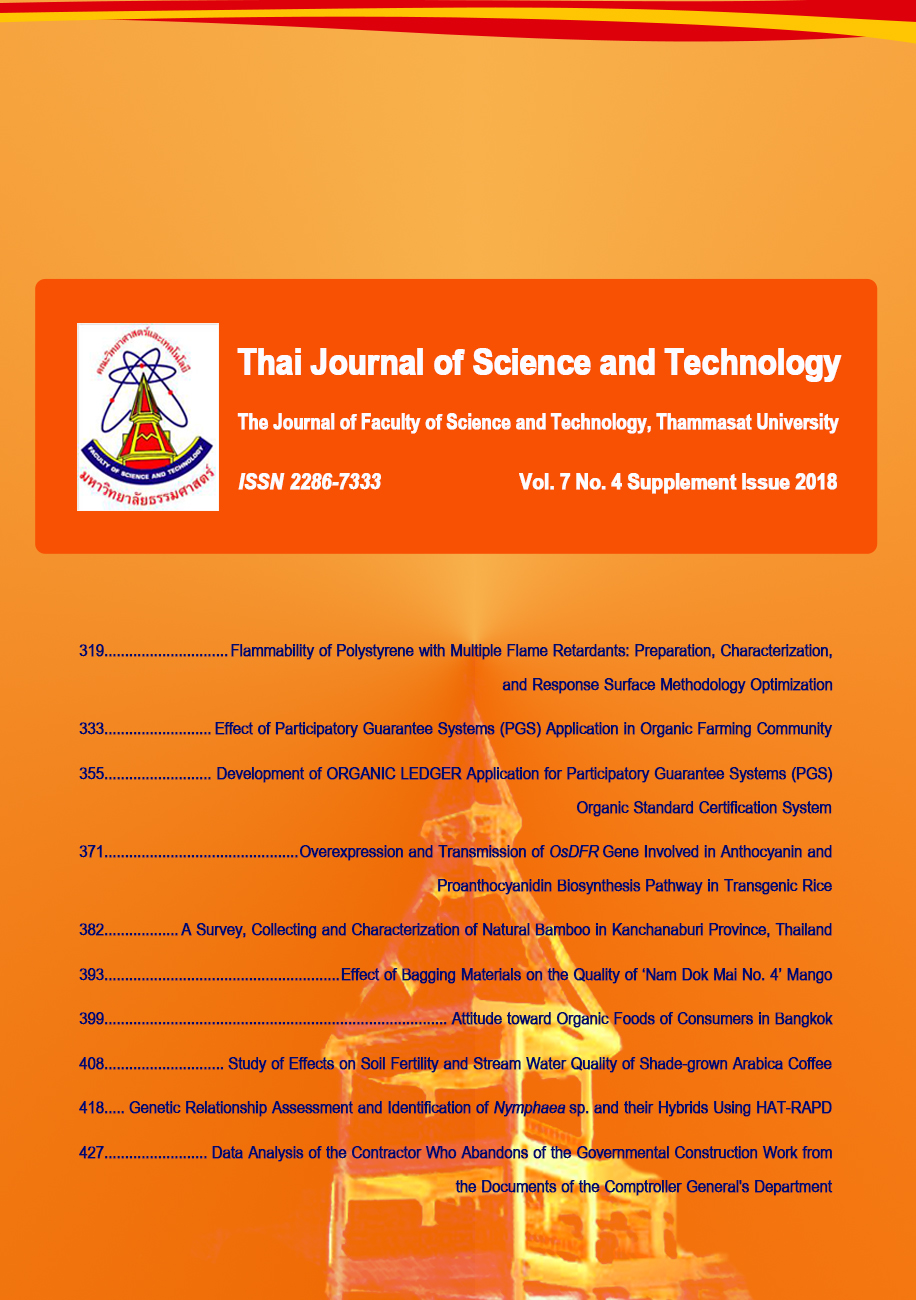ผลของการใช้ระบบการรับรองแบบมีส่วนร่วม (พีจีเอส) ในชุมชนเกษตรอินทรีย์
Main Article Content
Abstract
บทคัดย่อ
การวิจัยครั้งนี้มีวัตถุประสงค์เพื่อศึกษาผลของระบบการรับรองมาตรฐานเกษตรอินทรีย์แบบมีส่วนร่วมพีจีเอสต่อกระบวนการผลิตเกษตรอินทรีย์ รายได้เกษตรกร การเพิ่มขีดความสามารถของเกษตรกรเพศหญิง สิทธิมนุษยชน สุขภาพเกษตรกร การเข้าถึงอาหารคุณภาพของเกษตรกรและสมาชิกชุมชน การยอมรับของผู้บริโภค และความพึงพอใจของเกษตรกรต่อระบบพีจีเอส โดยกลุ่มเป้าหมาย คือ เกษตรกรผู้ที่ผ่านการรับรองมาตรฐานเกษตรอินทรีย์ด้วยระบบพีจีเอส ซึ่งเป็นสมาชิกของกลุ่ม 1 สหกรณ์เกษตรอินทรีย์เชียงใหม่ จำกัด จังหวัดเชียงใหม่ และกลุ่ม 2 สหกรณ์เกษตรอินทรีย์ทัพไท จำกัด อำเภอปราสาท จังหวัดสุรินทร์ ผลการวิจัยพบว่าพีจีเอสช่วยลดต้นทุนการผลิตด้านปุ๋ยเคมีและสารเคมีป้องกันกำจัดศัตรูพืชของสมาชิกกลุ่ม 1 และ 2 เท่ากับ 62.81 และ 51.22 เปอร์เซ็นต์ ตามลำดับ ผลิตผลและผลิตภัณฑ์ของสมาชิกกลุ่ม 1 และ 2 ที่ผ่านการรับรองด้วยระบบพีจีเอสมีราคาเพิ่มขึ้น 20-276.3 และ 9-1,000 เปอร์เซ็นต์ ตามลำดับ ส่งผลให้สมาชิกกลุ่ม 1 และ 2 มีรายได้เฉลี่ยต่อคนต่อปีเพิ่มขึ้น 20 และ 50 เปอร์เซ็นต์ ตามลำดับ อีกทั้งระบบพีจีเอสยังเพิ่มความมั่นใจให้แก่เกษตรกรในการทำเกษตรอินทรีย์ที่เป็นมิตรกับสิ่งแวดล้อมเช่นเดียวกับเกษตรกรเคยปฏิบัติมาแต่เดิม เกษตรกรได้เรียนรู้จากการปฏิบัติจริง ส่งผลให้จำนวนเกษตรกรที่เคยมีสารพิษตกค้างในเลือดเกินเกณฑ์ที่มาตรฐานกำหนดและอยู่ในสภาวะเสี่ยงลดลง 78.57-100 เปอร์เซ็นต์ ซึ่งเกษตรกรแสดงทัศนะที่ดีต่อพีจีเอสในการเป็นเครื่องมือช่วยส่งเสริมให้เกษตรกรมีคุณภาพชีวิตดีขึ้น เพิ่มขีดความสามารถของเกษตรกรเพศหญิงและสิทธิมนุษยชน ตลอดจนเพิ่มโอกาสในการเข้าถึงอาหารคุณภาพของเกษตรกรและสมาชิกชุมชนได้ 100 เปอร์เซ็นต์ ผู้บริโภคให้การยอมรับผลิตผลและผลิตภัณฑ์เกษตรอินทรีย์ที่ผ่านการรับรองด้วยระบบพีจีเอส 100 เปอร์เซ็นต์ แสดงให้เห็นว่ากระบวนการของพีจีเอส ได้แก่ การรวมกลุ่มแสดงทัศนคติที่ดีร่วมกันของเกษตรกรและการตรวจเยี่ยมฟาร์มเพื่อน จัดเป็นการเพิ่มขีดความสามารถของชุมชนเกษตรกรฐานราก บนพื้นฐานความโปร่งใส พึ่งพาตนเองได้ และมีความยืดหยุ่นต่อสถานการณ์ต่าง ๆ ตามบริบทที่แตกต่างกัน จัดเป็นผลกระทบเชิงบวกต่อการทำการเกษตร ซึ่งเป็นวิถีชีวิตของสมาชิกชุมชนอย่างแท้จริง
คำสำคัญ : สหกรณ์เกษตรอินทรีย์ทัพไท; สหกรณ์เกษตรอินทรีย์เชียงใหม่; พีจีเอส; การเข้าถึงอาหาร; เกษตรกรรายย่อย
Abstract
This study was focused on the effect of participatory guarantee system (PGS) on organic farming certification concerned in organic farming process, farmer income, gender empowerment of female farmer, human rights, farmer health, quality food reach of farmer and their community, consumer acceptation to PGS products, and farmer response to PGS. Target groups of this study were the farmers who had PGS certified including the member group 1, PGS Chuang Mai Organic Cooperatives limited group, Chiang Mai, and group 2, Tubthai Organic Cooperatives, Surin. Results revealed that PGS help reduce farming production cost, chemical pesticides and chemical fertilizers, of the member group 1 and 2 with 62.81 and 51.22 %, respectively. Premium price’s PGS-certified organic products of the member of group 1 and 2 increased with 20-276.3, and 9-1,000 %, respectively. Farmer income group 1 and 2 were increased by PGS with 20 and 50 %, respectively. Moreover, PGS help existing organic farmers become more confident to continue on the chemical-free and environmentally friendly farming practical as same as they have been doing. Though learning by doing, number of farmers who had blood chemical residue reduced 78.57-100 %. They become more convince that PGS is a credible and effective certification tool for better quality of life and also enhances human right and gender empowerment of female farmers. Quality food reach of farmers and their community was increased by PGS with 100 %. Consumer acceptation to PGS products and farmer response to PGS was 100 % increased. The process of PGS such as regular meeting on agreed principles, group consultation and peer review inspection lead to capacity building of grass-root organization, empowerment, sense of democracy, self-reliance and resilience from external circumstance, which ultimately leads to positive impacts on other issues other than agriculture aspect.
Keywords: Tubthai Organic Cooperatives; Chuang Mai Organic Cooperatives limited group; PGS; quality food reach; small farmer
Article Details
บทความที่ได้รับการตีพิมพ์เป็นลิขสิทธิ์ของคณะวิทยาศาสตร์และเทคโนโลยี มหาวิทยาลัยธรรมศาสตร์ ข้อความที่ปรากฏในแต่ละเรื่องของวารสารเล่มนี้เป็นเพียงความเห็นส่วนตัวของผู้เขียน ไม่มีความเกี่ยวข้องกับคณะวิทยาศาสตร์และเทคโนโลยี หรือคณาจารย์ท่านอื่นในมหาวิทยาลัยธรรมศาสตร์ ผู้เขียนต้องยืนยันว่าความรับผิดชอบต่อทุกข้อความที่นำเสนอไว้ในบทความของตน หากมีข้อผิดพลาดหรือความไม่ถูกต้องใด ๆ
References
Altenbuchner, C., Vogel, S. and Larcher, M., 2017, Effects of organic farming on the empowerment of women: A case study on the perception of female farmers in Odisha, India, Women's Stud. Int. Forum 64: 28-33.
Castro, F., 2014, Overview of Participatory Guarantee Systems in 2013, In Willer, H. and Lernoud, J. (Eds.), The World of Organic Agriculture, Statistics and Emerging trends 2014, IFOAM (Bonn) and FiBL (Frick).
Bakewell-Stone, P., Lieblein, G. and Francis, Ch., 2008, Potentials for organic agriculture to sustain livelihoods in Tanzania, Int. J. Agric. Sustain. 6: 22-36.
Fabiansson, S., 2014, Safety of Organic Foods, In Motarjemi, Y., Moy, G. and Todd, E. (Eds.), Encyclopedia of Food Safety 3: 417-422.
Hendel, D., 1977, AERA Mini Presentation, Value based Management.net. 7-S Framework of McKinsey, Available Source: https://www.valuebasedmanagement.net/methods_7S.html, February 9, 2017.
Home, R., Bouagnimbeck, H., Ugas, R. and Arbenz, M., (in review), Success factors in the implementation and maintenance of participatory guarantee systems, Agricul-ture and Human Values.
FAO, IFOAM and UNCTAD, Summary report international task force on harmonization and equivalence in organic agriculture 2003-2008, Available Source: https://r0.unc tad.org/trade_env/itf-organic/meetings/itf8/I TF_Summary_Report_081216db_%20final.pdf, February 9, 2016.
Ifad (International Fund for Agricultural Development), 2003, The adoption of organic agriculture among small farmers in Latin America and the Caribbean, Available Source: https://www.ifad.org/e.
IFOAM, Policy Brief: How Government Can support participatory guarantee system, Available Source: https://www.ifoam.bio/sites /default/files/page/files/policybrief-howgove rnmentscansupportpgs_0.pdf, February 9, 2016.
IFOAM (International Federation of Organic Agriculture Movements), 2015. Policy Brief: How Governments Can support Participatory Guarantee Systems (PGS), IFOAM, Bonn, Germany.
ISEAL, P035 ISEAL Common Requirement for the Certification of Producer Groups, Public Version 1, November 2008, Available Source: https://www.isealalliance.org/resour ces/p035-iseal-common-rqmts-for-produce r-group-cert-v1-nov08, February 9, 2016.
Kirchner, C., 2014, Participatory Guarantee Systems (PGS): How PGS can Intensify Knowledge Exchange between Farmers. Paper presented at IFOAM Organic World Congress 2014, ‘Building Organic Bridges’, 13-15 October, Istanbul, Turkey.
Lundberg, J. and Moberg, F., 2009, Report: Organic Farming in Brazil. Swedish Society for Nature Conservation, Stockholm, Sweden, Available Source: https://www. ifoam.bio.
Malakouti, J., 2014, Organic agriculture is the way of human salvation, J. Sabzineh 92: 15-16.
Nelson, E., Gomez Tovar, L., Schwentesius Rindermann, R. and Gómez Cruz, M., 2010, Participatory organic certification in Mexico: an alternative approach to maintaining the integrity of the organic label, Agric. Human 27: 227-237.
Nelson, E., Gomez Tovar, L., Gueguen, E., Humphries, S., Landman, K. and Schwentesius Rindermann, R., 2015, Participatory guarantee systems and the reimagining of Mexico’s organic sector, Agric. Human 32: 1-16.
Reyes, T., 2008, Agroforestry systems for sustainable livelihoods and improved land management in the East Usambara Mountains, Tanzania, Academic Disserta-tion, Helsinki.
Sethuraman, G. and Naidu, S., 2008, International Encyclopedia of Agricultural Science and Technology: Organic Farming, Mittal Publications, New Delhi.
Trauger, A., 2004, Because they can do the work: Women farmers and sustainable agricul-ture, Ge¬nder Place Culture 11: 289-307.


